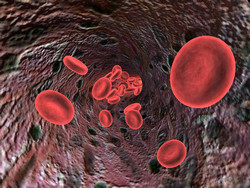Testing new therapies to effectively combat anaemia
These trials, which aim to evaluate the safety and tolerability of the protein in healthy volunteers, began in December 2014 as part of the EU-funded EUROCALIN project. The team behind the trials hopes to bring the drug – called PRS-080 – one step closer to patients who currently do not respond to anaemia treatments. The new therapy works by mobilising iron trapped in iron storage cells. While there are several different types of anaemia and different causes for the condition, iron deficiency anaemia is the most common type. Data from the initial phase of these clinical trials are expected before the end of 2015, when the EUROCALIN project is due for completion. If PRS-080 proves successful, then sufferers from what is known as Anaemia of Chronic Disease (ACD) stand to benefit hugely. This condition is marked by a deficiency of red blood cells or of haemoglobin in the blood, resulting in pallor and weariness. Under certain conditions (such as chronic infection, chronic immune activation or malignancy), iron – which carries oxygen in red blood cells – is reduced in the body. This can be serious. Anaemia in patients with chronic kidney disease (CKD) for example is often treated by administering what are called erythropoiesis-stimulating agents (ESA). However, around 10 % of patients are hypo- or non-responsive to ESA, leaving them without an effective treatment option. This is a significant health issue that needs to be addressed. The EUROCALIN project, which began in August 2011, brought together ten companies and academic institutions from across Europe to bring the new protein treatment for ACD sufferers through the first stages of clinical evaluation. The treatment focuses on a small peptide found in human blood that could play a key role in negatively regulating iron stability. By blocking this peptide – called hepcidin – PRS-080 has the potential to increase the availability of iron in the body’s circulation and thus increase haemoglobin levels in patients suffering from anaemia. Trials have been conducted in a placebo-controlled, blinded study using 48 healthy subjects. Some 36 volunteers were administered with PRS-080 while the remaining 12 were administered with the placebo. In addition to pushing PRS-080 further along the path towards commercialisation, EUROCALIN project partners also hope that the trial will help to streamline the process for developing similar protein-based therapies. Ultimately, the EUROCALIN project team is confident that clinical trials will result in safe and effective treatments to reduce anaemia and improve ACD patient responses, and aid the future development of similar therapeutic interventions for other diseases. Following completion of the trial and dissemination of the findings, the team behind the drug hopes to commence a study of patients with kidney disease across multiple locations in Europe. For further information please visit: EUROCALIN http://www.eurocalin-fp7.eu/
Countries
Germany



